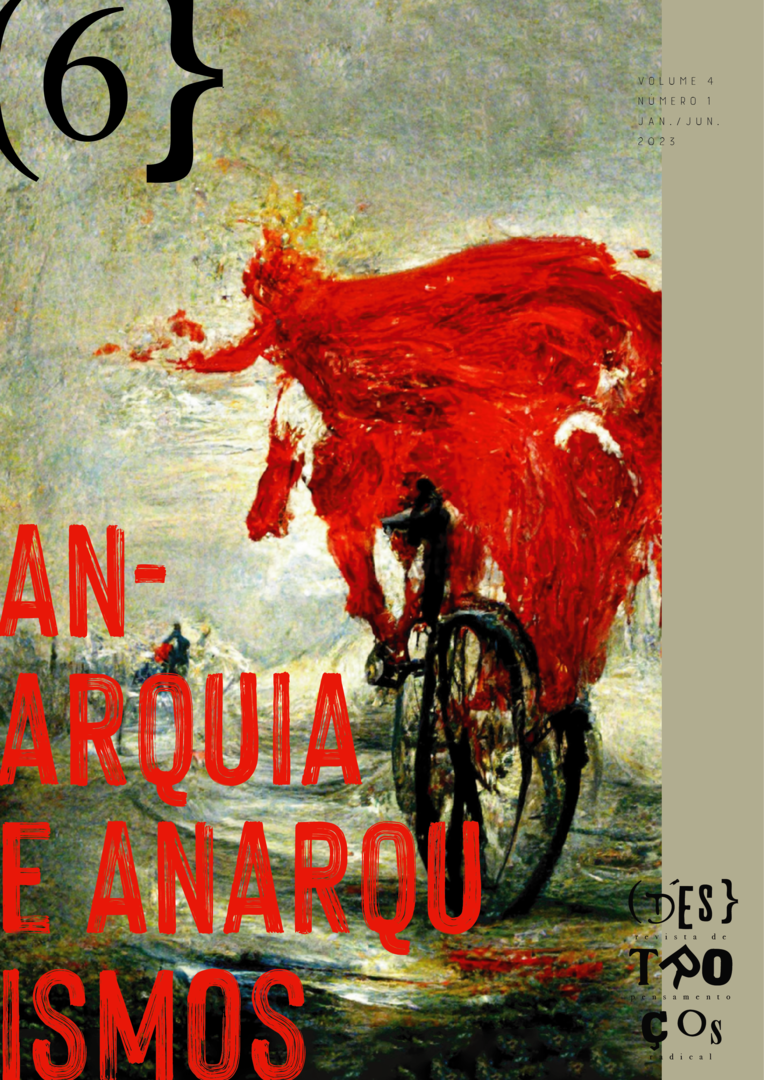Published 2023-06-23
Keywords
- Present,
- Anarchy,
- Theatre,
- Acedia,
- Transformation
How to Cite
Copyright (c) 2023 Yolanda Gloria Gamboa Muñoz

This work is licensed under a Creative Commons Attribution-NonCommercial 4.0 International License.
Abstract
This article aims to explore the relationships between the present, anarchy, theater, acedia, and transformation by employing a specific contemporary philosophical framework rooted in Nietzsche and adopting the form of an open essay. Within this context, philosophical figures are selected as instrumental operators who navigate a theatrical trajectory, creating their own distinct stage. This approach acknowledges their necessary historical and philosophical limitations while emphasizing the presentation and mapping of the themes surrounding the present anarchic movement. The structure of the article unfolds in the following manner: it begins by drawing back the curtains on the theater of the present (I), providing a contemporary glimpse into the thematic elements presented through the characters Nietzsche, Foucault, and Veyne (II). It then introduces a philosophical exploration that harkens back to the ancient stage, seeking to establish a potential thematic connection between theater, the present, and acedia. This section also incorporates specific contributions from the preceding scene (III). Finally, as the curtains of the theater of the present close, the article materializes certain open-ended questions embedded within the transformative theme, drawing from ongoing research conducted in our present-day contexts (IV).
Downloads
References
- AGAMBEN, Giorgio. Angeli e demoni. Quodlibet, 4 ago. 2022. Disponível em: https://www.quodlibet.it/giorgio-agamben-angeli-e-demoni. Acesso: 18 set 2022.
- CAVARGERE, Claudio. O demônio em cena: um ensaio sobre a comédia humana. Destinatário: Yolanda Glória Gamboa Muñoz. Pontifícia Universidade Católica de São Paulo, 2. sem. 2022. Dissertação.
- DIDI-HUBERMAN, Georges. Quando as imagens tomam posição: o olho da história, I. Trad. Cleonice Paes Barreto Mourão. Belo Horizonte: UFMG, 2016.
- DOTTO, Pedro Maurício García. Usos da liberdade e agonismo em Michel Foucault. São Paulo: Intermeios: Fapesp, 2018.
- FOUCAULT, Michel. Ariane s’est pendue. In: FOUCAULT, Michel. Dits et écrits I. Paris: Gallimard, 1994. p.767-771.
- FOUCAULT, Michel. Pierre Boulez, l’écran traversé. In: FOUCAULT, Michel. Dits et Écrits IV. Paris: Gallimard, 1994. p. 219-222.
- FOUCAULT, Michel. Theatrum philosophicum. In: FOUCAULT, Michel. Dits et Écrits II. Paris: Gallimard, 1994. p. 75-99.
- FOUCAULT, Michel. Sept propos sur le septième ange, Montpellier: Fata Morgana, 1986.
- GIANNINI, Humberto. El demonio del mediodía. Revista Teoría, 5-6, Universidad de Chile, diciembre de 1975.
- GOLDSCHMIDT, Victor Le système stoicien et l’idée de temps, Paris: Vrin, 1953.
- GOMES DA SILVA, L. Como pode o homem escapar de si mesmo? Uma leitura ficcional de Michel Foucault. Tese (Doutorado em Filosofia) – Programa de Estudos Pós-Graduados em Filosofia, Pontifícia Universidade Católica de São Paulo, São Paulo, 2019.
- MUÑOZ, Yolanda Gloria Gamboa. Ariadne/Artemidoro: máscaras liberadoras?. In: BUTTURI JR., Atilio; CANDIOTTO, Cesar; CAPONI, Sandra; SOUZA, Pedro (org.). Foucault & as práticas de liberdade II: topologias, políticas & heterotopologias. Campinas: Pontes, 2019. p.175-188.
- MUÑOZ, Yolanda Gloria Gamboa. Armadilhas, humor e transfiguração: M. Foucault, P. Veyne. In: CARNEIRO, Marcelo Carbone; GENTIL, Hélio Salles (org.). Filosofia Francesa contemporânea. São Paulo: Cultura Acadêmica, 2009. p.120-144.
- MUÑOZ, Yolanda Gloria Gamboa. Foucault e a liberdade após as Luzes. Revista Integração, São Paulo, v. 2, n. 5, p. 150-156, 1996.
- NIETZSCHE, Friedrich. Also sprach Zarathustra. Bonn: Insel Verlag, 2007.
- NIETZSCHE, Friedrich. Así habló Zaratustra. Trad. A. Sánchez Pascual. Madrid: Alianza Editorial, 1972.
- NIETZSCHE, Friedrich. Considérations inactuelles 1 et 2. Unzeitgemässe Betrachtungen I und II. Trad. de Geneviève Bianquis. Paris: Aubier-Montaigne, 1964.
- NIETZSCHE, Friedrich. Götzen-Dämmerung. Stuttgart: Insel Verlag, 1985.
- NIETZSCHE, Friedrich. Obras incompletas. Trad. R. R. Torres Filho. São Paulo: Abril Cultural, 1974.
- RUIZ, Raúl. Entrevistas escogidas. Filmografia comentada. Santiago: Universidad Diego Portales, 2013.
- STEPHAN Cassiana. Amor pelo avesso: de Afrodite a Medusa. Curitiba: Kotter, 2022.
- TORDESILLAS, Alonso. Hablar en su debido tiempo. Improvisación y 'kairos' en Alcidamante de Elea. Diálogos, n. 90, p. 345-360, 2007. Disponível em: https://revistas.upr.edu/index.php/dialogos/article/view/16132. Acesso em: 21 jun. 2023.
- VEYNE, Paul. A história: uma paixão nova (mesa-redonda). In: LE GOFF, J. et al. A nova história. Trad. de Ana Maria Bessa. Lisboa: Edições 70, 1980.
- VEYNE, Paul. “Avant-propos, Préface, Bibliographie, Chronologie, Introductions, Traductions revues et Notes”. In: VEYNE, Paul. Sénèque. Paris: Robert Laffont, 1993.

